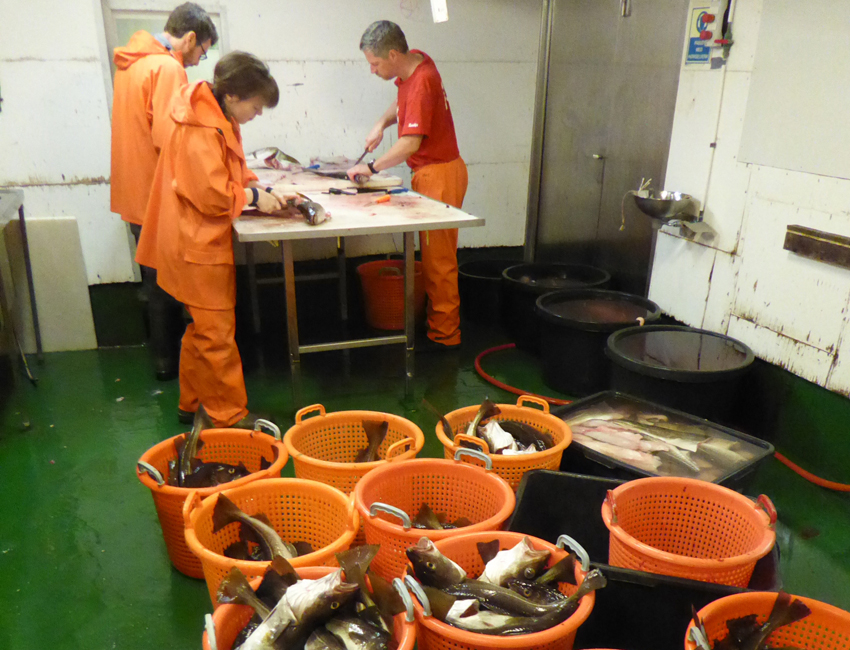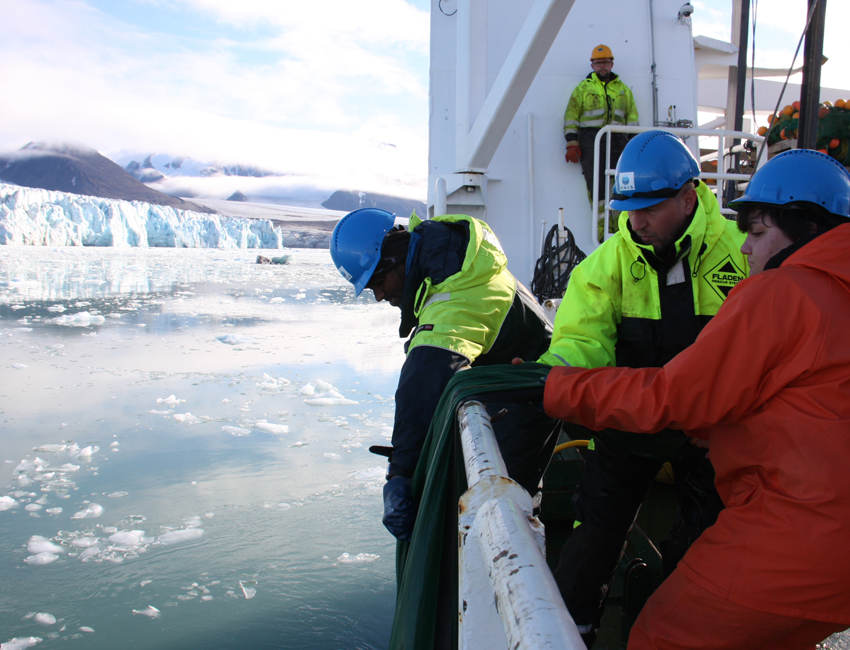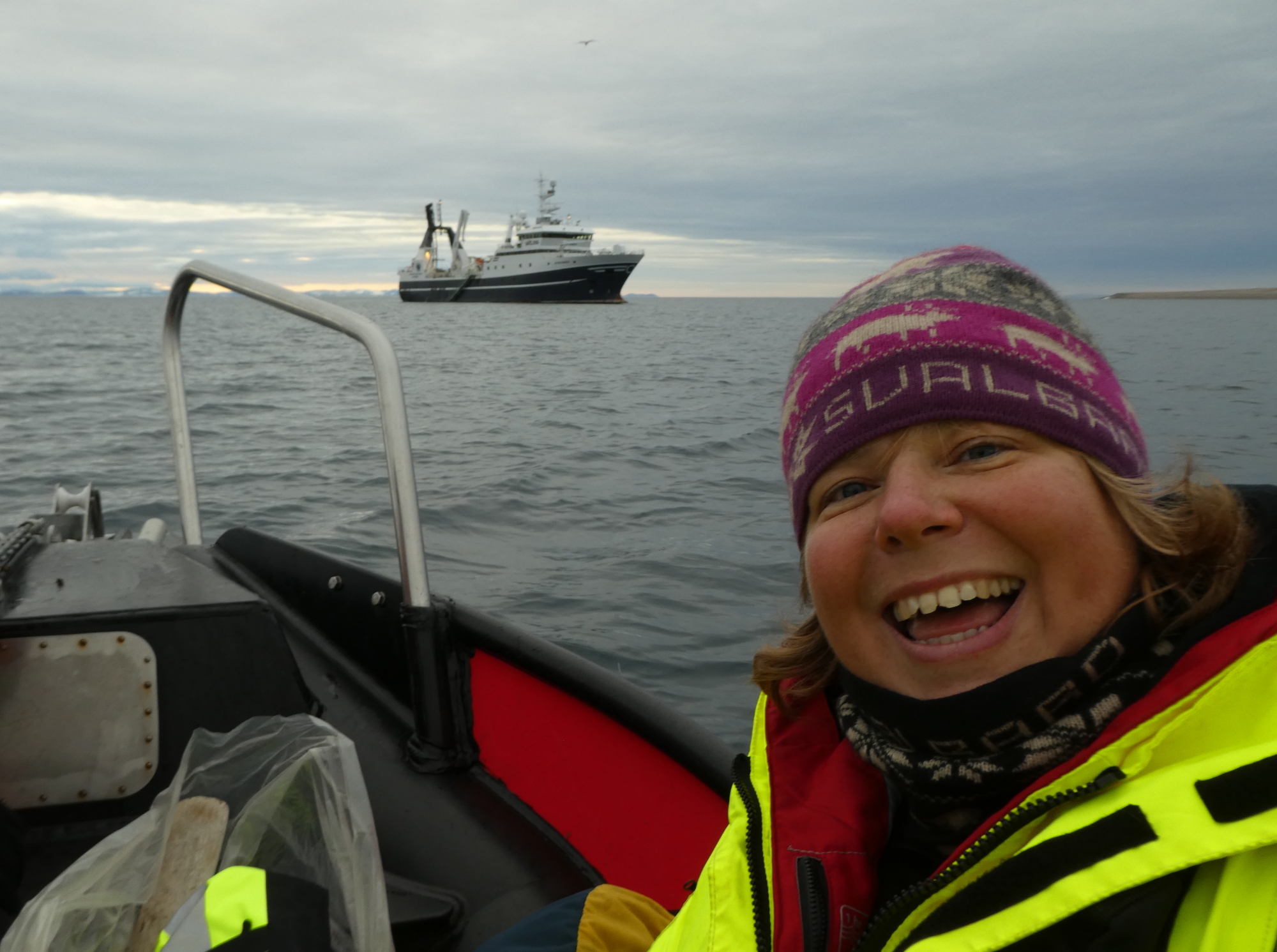AB-820 Arctic Marine Zooplankton (10 ECTS)
ID:
AB-820
CREDITS:
10 ECTS
APPLICATION DEADLINE:
April 15, 2024
START DATE:
August 19, 2024
END DATE:
September 27, 2024

Hauling of zooplankton net on the AB-320 course cruise. Photo: Malin Daase.
| Grade: | Letter grade (A through F) |
| Course Cost: | Scientific cruise: NOK 2000,- (10 days x NOK 200 per day) |
| Course Capacity Min/Max: | 9/18 students (AB-320/820 in total) |
| Language of instruction: | English |
| Examination support material: | Bilingual dictionary between English and mother tongue |
UNIS contact person: Janne Søreide
Course requirements
Enrolment in a PhD programme in biology and knowledge similar to AB-202 Marine Arctic Biology.
Basic knowledge of statistics and the statistical program R or Python will be advantageous.
Academic content
In this course, we will study zooplankton in different Svalbard fjords and off-shore locations to learn how differences in the physical (hydrography, sea ice) and biological environment (production regime, predator community) affect zooplankton community, population and size structure. The students will gain knowledge on zooplankton taxonomy, biogeography, ecology and life history traits of common zooplankton species in Svalbard waters and the polar basin North of Svalbard.
The course has a special emphasis on morphological identification of zooplankton (see below), and on physical-biological interactions in Arctic pelagic ecosystem.
Lectures focus on zooplankton taxonomy, life history traits of Arctic zooplankton and their adaptations to the high seasonality, trophic interactions, physical and biological drivers of distribution and production as well as an introduction to the physical oceanography around Svalbard.
Students will get first-hand experience in standard zooplankton and pelagic fish sampling procedures during the mandatory 6-10 days cruise with research vessel Helmer Hanssen. Students will collect important hydrography and plankton data to maintain biological time series in Svalbard and by doing so gain expertise in measuring various environmental parameters and processing of these data.
After the cruise, one week of lab work is dedicated to work up samples not yet analysed onboard and for detailed zooplankton community analyses using steromicroscopes. The cruise will target contrasting hydrographic regimes in waters around Svalbard to contrast boreal with Arctic communities. The cruise plan will vary from year-to-year depending on ongoing research activities and students will get valuable insights into research and monitoring activities during the cruise.
Learning outcomes
Upon completing the course, the students will have:
Knowledge
- advanced insight into taxonomy, biogeography and ecology of common Arctic marine zooplankton species in Svalbard waters
- the ability to assess oceanographic and ecological interactions and the role of zooplankton in Arctic pelagic food-webs
- specialized knowledge on how zooplankton are adapted to Arctic conditions and insights into the effects of climate warming on Arctic zooplankton
Skills
- experience in using common tools designed to sample different size classes of zooplankton
- thorough knowledge of processing zooplankton samples quantitatively and analysing zooplankton community and hydrographic data
- the ability to identify common Arctic marine zooplankton species and their developmental stages
General competences
- experience in analysing field data in context to scientific literature and in evaluating biodiversity data
- skills in write scientific reports, applying basic statistics, visualizing data and communicating results
- developed skills related to teamwork (practical in the field, in the lab and from writing the scientific report).
Learning activities
The course extends over 5-6 weeks including compulsory safety training and is run in combination with AB-320.
Learning will be achieved via a combination of lectures, intensive field-, lab and group work.
1-2 week theoretical introduction and preparation of field activities will be followed by a 6-10 day mandatory research cruise. During the cruise, sampling will be conducted in different localities around Svalbard (fjord and off-shelf). The cruise is followed by a week of intensive lab work to analyse samples collected during the field campaign, focusing on species identification and other relevant analysis of the collected material. The last week will be reserved for writing the lab report, presenting results and preparing for the exam.
AB-820 students will by the end of the course deliver a scientific report (written as a scientific paper). The deadline for this report is one week after the exam (home work), but it is compulsory to deliver an outline of the report before the exam.
Summary
- Total lecture hours: 40 hours.
- Laboratory work / exercises / seminars: 60 hours.
- Scientific cruise: Ca. 10 days
Compulsory learning activities
All compulsory learning activities must be approved in order to sit the exam.
- Field excursions and technical report
Assessment
- All assessments must be passed in order to pass the course.
- Each assessment is graded, and subsequently combined into a single grade. Partial grades for each assessment will be available.
| Method | Duration |
Percentage of final grade
|
| Practical exam | 20% | |
| Written report (scientific article) | 30% | |
| Written exam | 5 hours | 50% |
Student life


